
Armin Kircher (1966 – 12 October 2015) was an Austrian composer and conductor. [1]

Armin Kircher (1966 – 12 October 2015) was an Austrian composer and conductor. [1]
Born in Kufstein, Austria, Kircher grew up in Breitenbach am Inn and completed his matura in 1985 at the College Borrpmaeum in Salzburg.
He led the church music department of the Archdiocese of Salzburg and was, from 1992 to 2015, the organizational manager of the Austrian working week for church music. [2] He was also a conductor at the Collegiate Church of St. Peter in Salzburg and organist at the oldest preserved organ in the city of Salzburg in the Kajetanerkirche. [3]
He was the editor of several editions of ancient and modern choral music. He wrote numerous refrains in praise of God in 2013. [4]
Kircher died on 12 October 2015 of heart failure.
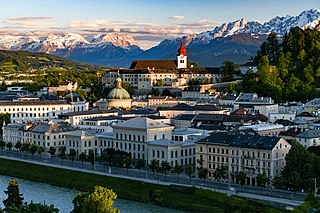
Salzburg is the fourth-largest city in Austria. In 2020, it had a population of 156,872.

Johann Nikolaus Harnoncourt or historically Johann Nikolaus Graf de la Fontaine und d'Harnoncourt-Unverzagt; was an Austrian conductor, particularly known for his historically informed performances of music from the Classical era and earlier. Starting out as a classical cellist, he founded his own period instrument ensemble, Concentus Musicus Wien, in 1953, and became a pioneer of the Early Music movement. Around 1970, Harnoncourt began conducting opera and concert performances, soon leading international symphony orchestras, and appearing at leading concert halls, operatic venues and festivals. His repertoire then widened to include composers of the 19th and 20th centuries. In 2001 and 2003, he conducted the Vienna New Year's Concert. Harnoncourt was also the author of several books, mostly on subjects of performance history and musical aesthetics.

Herbert von Karajan was an Austrian conductor. He was principal conductor of the Berlin Philharmonic for 34 years. During the Nazi era, he debuted at the Salzburg Festival, with the Vienna Philharmonic, the Berlin Philharmonic, and during the Second World War he conducted at the Berlin State Opera. Generally regarded as one of the greatest conductors of the 20th century, he was a controversial but dominant figure in European classical music from the mid-1950s until his death. Part of the reason for this was the large number of recordings he made and their prominence during his lifetime. By one estimate, he was the top-selling classical music recording artist of all time, having sold an estimated 200 million records.
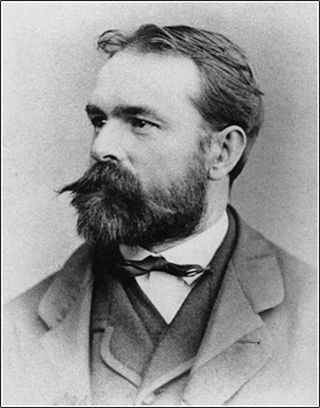
Josef Gabriel Rheinberger was a Liechtensteiner organist and composer, residing in Bavaria for most of his life.

Nonnberg Abbey is a Benedictine monastery in Salzburg, Austria. Founded c. 712/715 by Saint Rupert of Salzburg, it is the oldest continuously existing nunnery in the German-speaking world. The monastery complex is today a protected monument and part of the Historic Centre of the City of Salzburg, a UNESCO World Heritage Site since 1996.

St Peter's Abbey, or St Peter's Archabbey, is a Benedictine monastery and former cathedral in the Austrian city of Salzburg. It is considered one of the oldest monasteries in the German-speaking area, and in fact the oldest with a continuous history since its foundation in 696.

Ricardo Moniz is a Dutch professional football manager and former player who is the head coach of Hungarian Nemzeti Bajnokság I club Zalaegerszeg.

Herbert Gantschacher is an Austrian director and producer and writer.

Hans-Christoph Rademann is a German choral conductor, currently the director of the Dresdner Kammerchor and the Internationale Bachakademie Stuttgart.
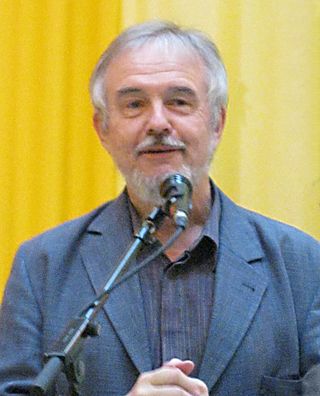
Peter Planyavsky is an Austrian organist and composer. He attended the Schottengymnasium. After graduating from the Vienna Academy of Music in 1966 he spent a year in an organ workshop, and has been instrumental in organ-building projects, notably the construction of the Rieger organ in the Great Hall of the Wiener Musikverein. In 1968 he was appointed organist in the Upper Austrian Stift Schlägl, and the following year organist at Vienna's St. Stephen's Cathedral. From 1983 until 1990 Planyavsky was their director of music, with overall responsibility for church music at the cathedral.
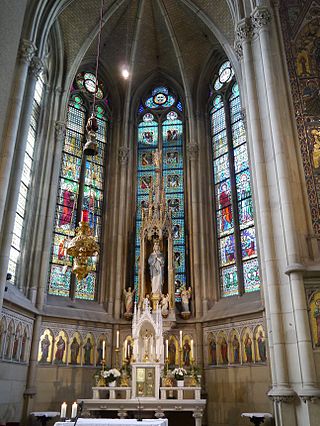
Locus iste, WAB 23, is a sacred motet composed by Anton Bruckner in 1869. The text is the Latin gradual Locus iste for the annual celebration of a church's dedication. The incipit, Locus iste a Deo factus est, translates to "This place was made by God". Bruckner set it for four unaccompanied voices, intended for the dedication of the Votivkapelle at the New Cathedral in Linz, Austria, where Bruckner had been a cathedral organist. It was the first motet that Bruckner composed in Vienna. It was published in 1886, together with three other gradual motets.
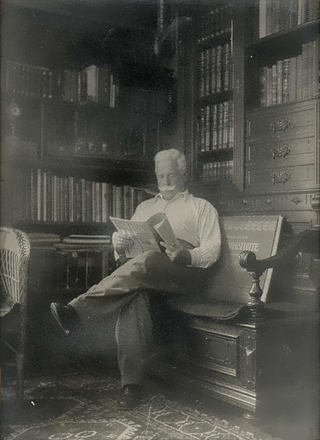
Alexander Kircher was an Austrian-German marine and landscape painter and illustrator. Many of his paintings can be seen in museums in Germany, Austria, Croatia, and Slovenia while others are held by private owners in those same countries, as well as the United States of America, Great Britain, Scandinavia, and Greece.
Gustav Gunsenheimer is a German director of church music and a composer of mostly sacred music and chamber music. First an elementary school teacher, he worked for decades as the church musician at St. Lukas in Schweinfurt, where he held annual festivals, conducted a notable choir, was responsible in the Bavarian organization of chorale conductors, and was a lecturer at the music university of Würzburg.

Deutsches Hochamt is the title common to several mass compositions by Michael Haydn, setting the mass ordinary in German by Franz Seraph von Kohlbrenner. Three of the works require trained singers and orchestra, while a fourth is kept simple to be sung by the congregation, as a Deutsche Singmesse (Betsingmesse). His best-known German High Mass is catalogued as MH 560. Haydn's masses in German are also known by the incipit of the first of ten songs, "Hier liegt vor deiner Majestät".
Patrick Vogel is a German operatic tenor.
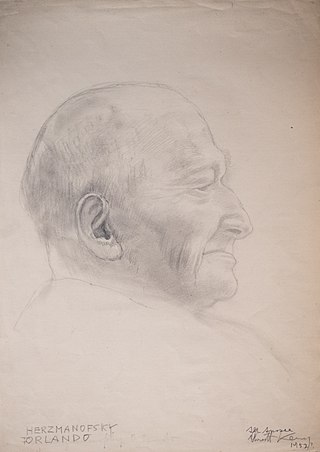
Fritz von Herzmanovsky-Orlando (1877–1954) was an Austrian writer and illustrator.
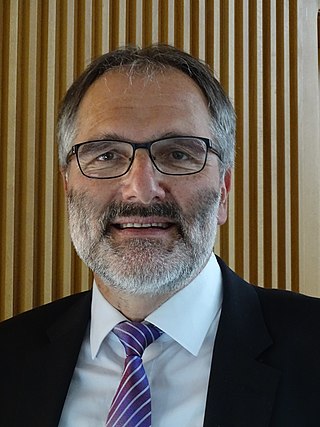
Matthias Hanke is a German organist and church musician. He is a regional head of church music of the Protestant church in Württemberg as Landeskirchenmusikdirektor of the Evangelische Landeskirche in Württemberg. Previously he was responsible for the church district of Böblingen and Kirchenmusikdirektor in Sindelfingen. His church choirs and orchestra have toured internationally, and made recordings.
Dietmar Werner Winkler is an Austrian scholar of patristics and ecclesiastical history. He is a professor and the founding director of the Center for the Study of the Christian East at the University of Salzburg.

The Missa primi toni octo vocum is a mass setting for double choir composed by Stefano Bernardi in 1630 for the Salzburg Cathedral where he was music director.